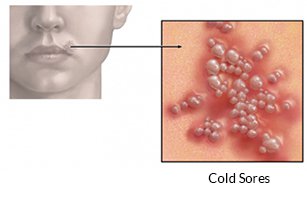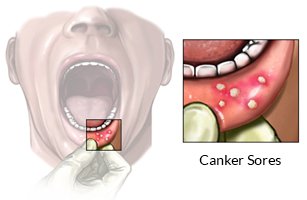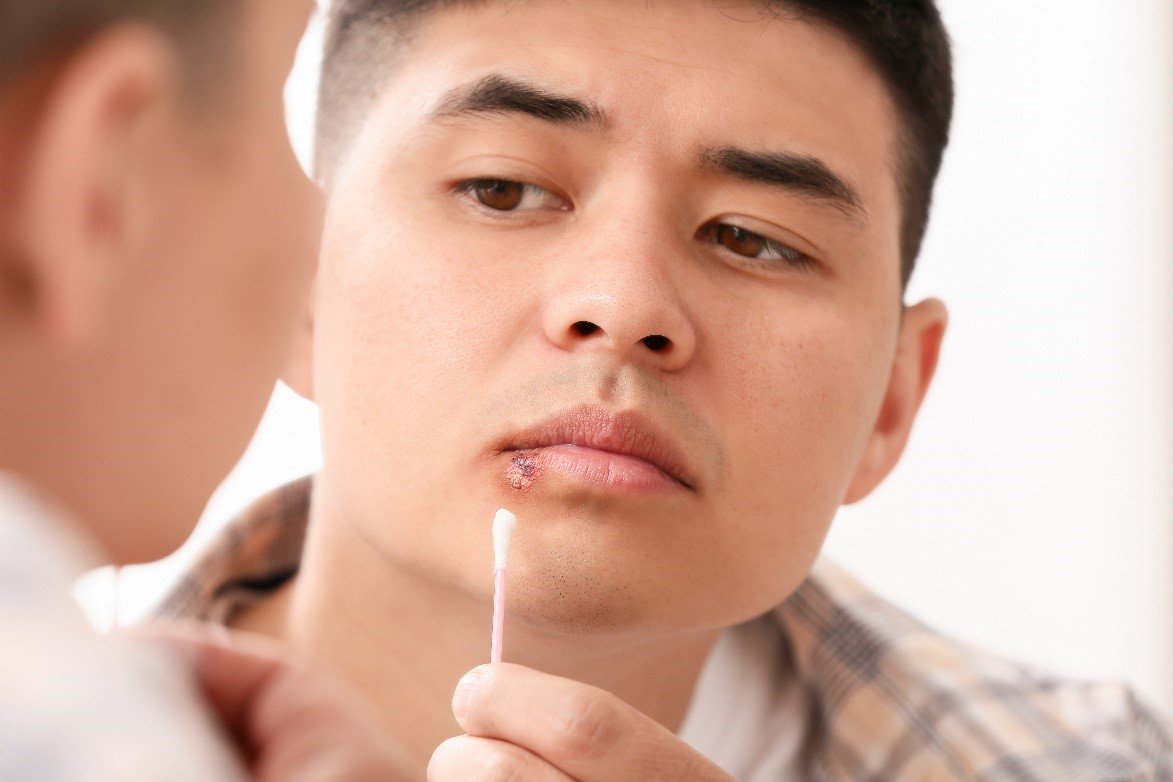Canker Sore vs. Cold Sore: How to Know the Difference
The basic difference between a cold sore and canker sore is that cold sores typically form on and around your lips, while canker sores form inside your mouth. Learn more about identifying cold sores vs. canker sores, what causes them, and what to use for pain relief.


What is a Cold Sore?
Cold sores, also called fever blisters, are fluid-filled blisters often found on and around the lips. They sometimes appear cloudy or as a white bump on the lip Or, if the blisters have burst, they can crust over into a scab. They are contagious and generally spread from person to person through close contact, including kissing or sharing utensils.
What Causes a Cold Sore?
Cold sores are not caused by colds or fevers, but they might show up on your lip when your immune system is fighting against infection. Most cold sores are caused by herpes simplex virus type 1 (HSV-1), although some may be caused by herpes simplex virus type 2 (HSV-2), which typically affects the genitals. About 90 percent of adults have been exposed to HSV-1 by age 50, so cold sores can be quite common.
Cold sores can be contagious even if you don’t see the sore on or around your lips. There is no cure for cold sores, though antiviral pills and creams can help sores heal quicker and may also reduce future outbreaks.
What is a Canker Sore?
Canker sores are mouth ulcers that develop on the inside of your cheeks and lips, under your tongue, on the roof of your mouth or at the base of the gums. These sores are an injury inside the mouth, often caused by factors like the foods you eat or biting your lips.
Canker sores do not occur on the outside of the lips and are not contagious. They are also smaller than cold sores and do not pus or blister but can still cause pain when talking or eating.
The mouth ulcers come in two forms. Simple canker sores are more common and may appear three or four times a year, generally lasting about one week. Complex canker sores are found more infrequently and, in more extreme cases, can last up to six weeks.
What Causes a Canker Sore?
The exact reason for why canker sores form is largely unknown. However, they may form because of things like stress, acidic foods or mouth injuries, and complex canker sores may develop in persons with weakened immune systems. If you regularly get canker sores, you might also want to speak with your doctor about food allergies, which may be triggering outbreaks.
Are Canker Sores and Cold Sores Related?
No, canker sores and cold sores are not related. Canker sores are not caused by the herpes simplex virus, like cold sores, and are not contagious or spread through personal contact. However, it is possible that you might have a cold sore and canker sore at the same time.
How Do You Tell if it’s Cold Sore or a Canker Sore?
As a general rule of thumb, the simplest way to identify a cold sore vs. a canker sore is this: if you find a bump or cluster of blisters on or around the outside of the lips, it’s a cold sore. Canker sores are gray or white spots found inside the mouth and are usually surrounded by an inflamed red area.
Can You Get Cold Sores Inside Your Mouth?
You can get sores inside your mouth, but these are typically canker sores, not cold sores. Most people contract HSV-1 (the virus that causes cold sores) during childhood, and that first infection might occur inside the mouth. However, this is still a rarity, and the overwhelming majority of cold sores are seen on the outside of the mouth.
Can You Pop a Cold Sore or Canker Sore?
It might be tempting to “pop” a cold sore because it appears on or around the surface of your lips and can impact physical appearance, but you should avoid fiddling with the blister. Popping a cold sore does not speed up the healing process and can lead to scarring. You also risk infection.
Likewise, you should avoid attempting to pop canker sores. Unlike cold sores, a canker sore is an ulcer, or actual wound within the mouth. The swelling from canker sores contains a mixture of white blood cells, bacteria and other fluids. You risk added pain and potential infection by trying to pop a canker sore.
Instead of popping a cold or canker sore, do your best to keep your hands away. If you feel an urge to touch the sore area, use the touch-free formula of Orajel™ to help ease any pain while remaining hands off. Remember, most cold and canker sores subside within two weeks. If you experience persistent pain and the sore has not gone away, consult a doctor or dentist.

Treatments for Cold and Canker Sores
It’s important to know whether you have a cold sore vs. a canker sore so that you choose the right treatments. Both cold and canker sores last about 7-14 days, but you can ease the pain and discomfort.
- Cold sores may be treated with antiviral creams that can help ease the symptoms of itching, burning and pain.
- Canker sores may be treated with mouth rinses or by using a topical cream with benzocaine, lidocaine or another anesthetic and rubbing it on your gums.
Avoiding acidic foods can also help you steer clear of further irritation when you have a cold or canker sore. You can also use over-the-counter pain relievers to ease soreness or discomfort.
Does Orajel™ Work on Cold Sores?
Orajel has two products that help relieve the pain and itching of cold sores: a cream and a no-touch liquid balm. The Touch-Free Cold Sore Patented Treatment helps relieve tingling, throbbing itching and pain* on contact.
The MoistureLock Cold Sore Treatment Cream uses 6 ingredients to treat the pain, itching and dryness associated with cold sores while helping protect chapped lips, soften scabs and mask redness caused by the cold sore.
*For temporary topical pain relief
Does Orajel™ Work on Canker Sores?
Orajel™ has an antiseptic rinses for treating mouth sores that are formulated to kill bacteria and promote healing of canker sores while easing gum irritation.
Additionally, the 3X Medicated for All Mouth Sores Gel contains 20 percent Benzocaine to relieve oral pain, plus Menthol to soothe gums and Astringent to help protect canker sores from irritation caused by eating and drinking.
Turn to Orajel™ to Help Treat Cold and Canker Sores
Cold and canker sores can cause quite a bit of annoyance and irritation. Turn to Orajel™ when you need to fight back against that aggravation and lesson your symptoms of a cold or canker sore.